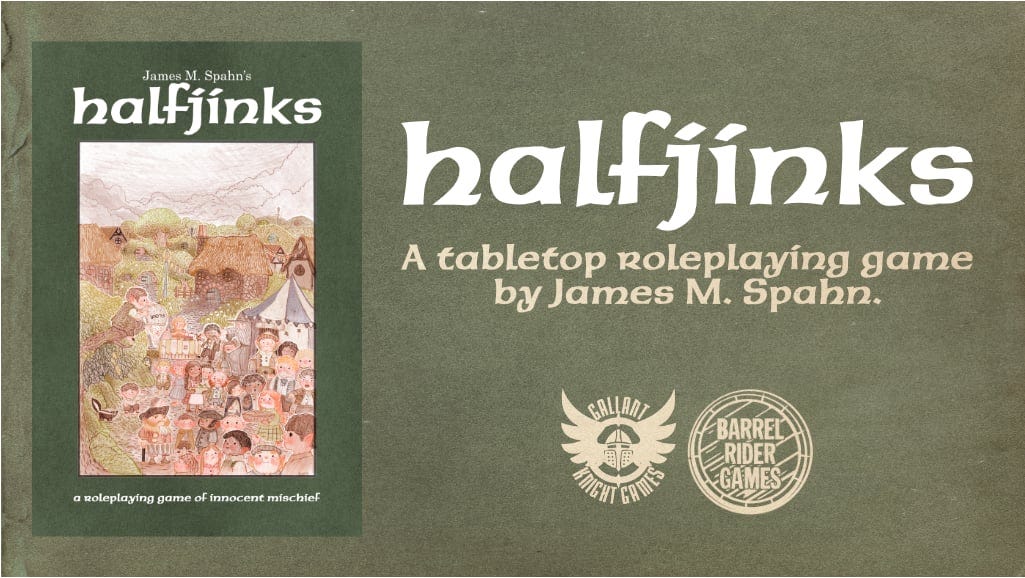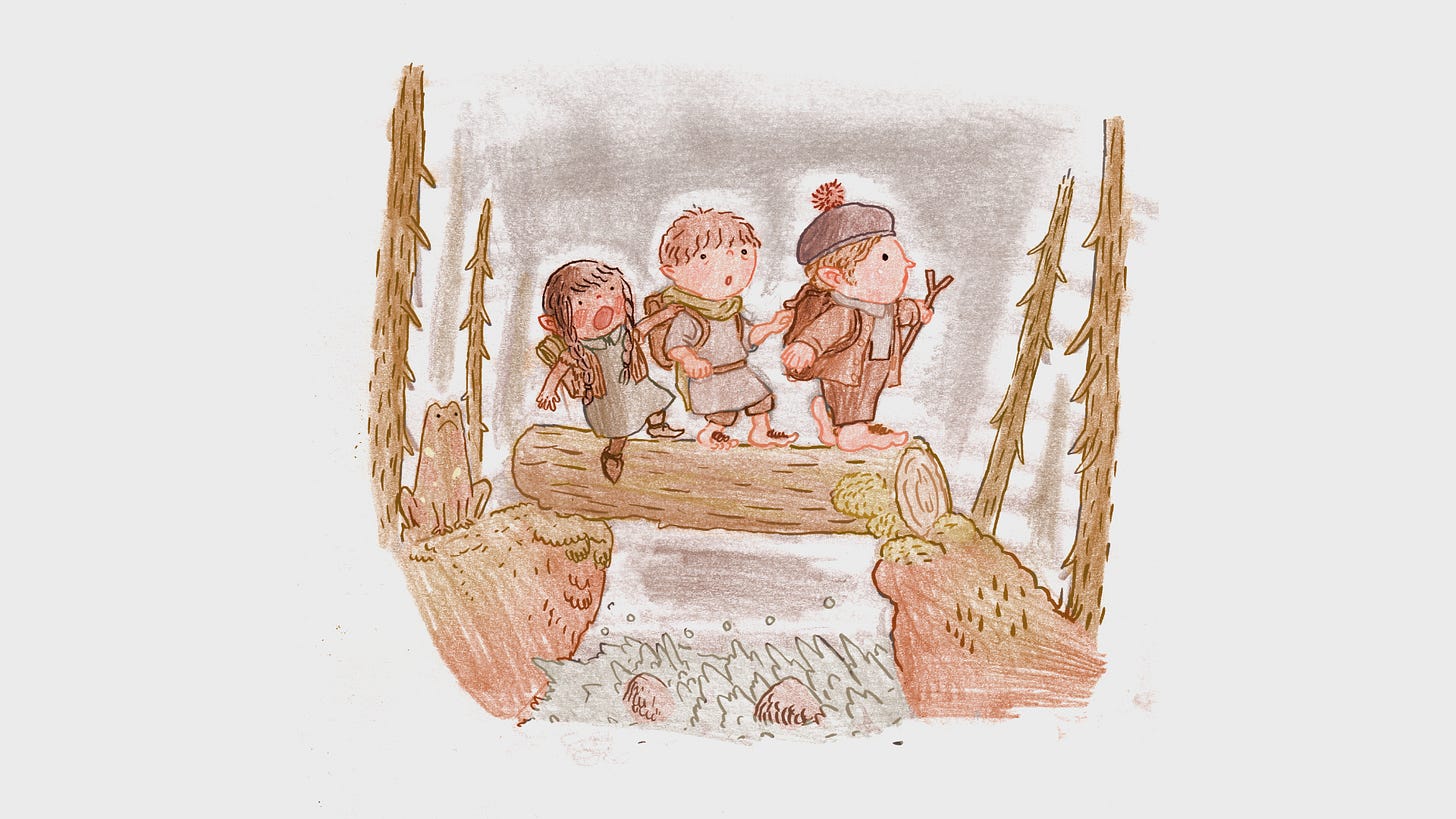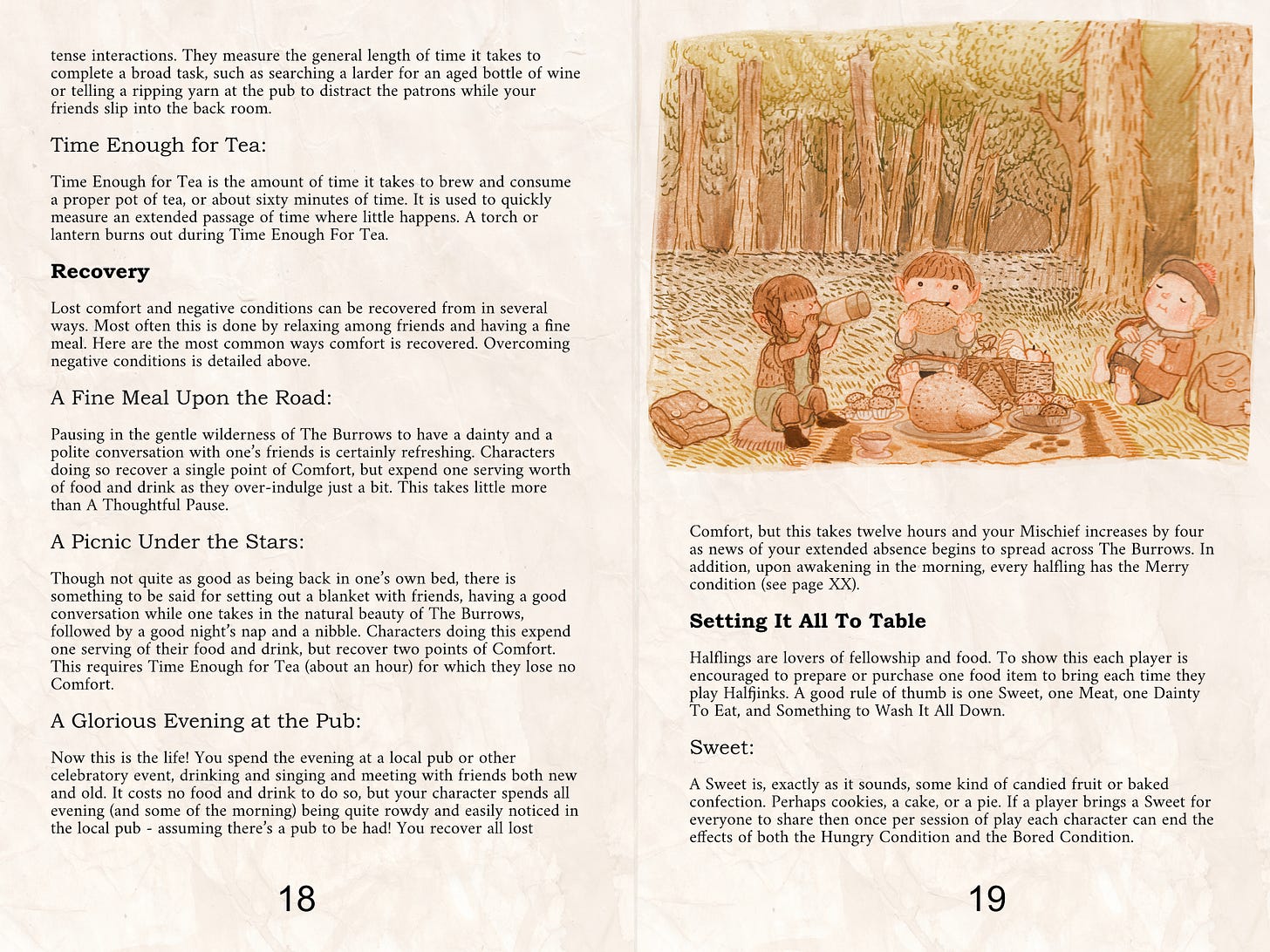In the the next week or two I plan on launching the Kickstarter for Halfjinks: A Family Friendly Roleplaying Game of Innocent Mischief. I’ve spoken ad nauseam about my love of halflings. Barrel Rider Games is a nod to a famous halfling. The first BRG product I ever released was called Halflings: Tales from the Fireside. I even had the honor of penning the Shire supplement for The One Ring 2e Starter Box. Heck, my son is named Sam for a reason ya know?
Halfjinks is a continuing exploration of my beloved halflings. I guess I have a fondness for diminutive heroes. That explains my love of the Redwall novels and it’s a short road from Redwall to the Mouseguard comics, and the Mausritter RPG. There’s something delightful and earnest and charming about all of these things - about these tiny, ordinary people. I guess because that’s how I feel often, in spite of often putting forth a confident, swashbuckling persona. (Don’t tell anyone, but I’m actually quite shy. Shh…)
The ordinary is so easy to overlook because, well… it’s ordinary. We see it every day. We take it for granted. That cup of coffee every morning. That TV show you watch every night before bed. The casual “love you” that you toss out to your spouse as you head out the door to work.
But in the end, isn’t that what all these heroic stories are about? Sure, in D&D you face dragons and beholders and illithids for coin and glory, but my life isn’t one where jewels and heroic tales are a common prize. I get a tackle-hug from Sam, a sly grin from Trixie, and maybe a nice barbecued chicken with a quality glaze. That’s my treasure. That’s my glory.
And I think it’s that way for most of us. Heck, that’s why a lot of us play these games right? Fantasies of power and glory and fame are intoxicating and I enjoy them as much as anyone. But I don’t love them. In the stories that matter to me, that’s why the heroes have gone off to face the impossible darkness. Frodo Baggins is trying to protect the Shire. Tristan Thorn is trying to win the affection of a local beauty. Bastion Balthazar Bux is trying to find the courage to face a world where his mother is gone.
These struggles are, above all things, ordinary. They’re things we face every day in our real life. Sure, all of these characters go off into wild, fantastic realms to find themselves and find their courage. But they all return to that ordinary world. It is where they belong.
Halflings are, for me, a reminder and personification of that ordinary joy. So Halfjinks is a game about ordinary adventures. And make no doubt that adventure exists in the ordinary world, if only we have the wide eyes to see it. Moreover, it’s a world we share and unlike the fantastic world (which we often only share with our fellow adventurers), the ordinary world is shared by an entire community, by family, by friends, by a community. It’s that sharing that makes it matter.
And those ordinary adventures can be an absolute hoot. When you’re not trying to save the world, counting XP, focusing on a character build, or trying to “finish the adventure,” you can relax. You can enjoy the game and enjoy each other’s company. That was a key part of what I was trying to bring out in Halfjinks. To that end, player characters in Halfjinks cannot die. In fact, they really can’t suffer meaningful injury. They might become Hungry or Addled - but true injury isn’t a part of the game. In addition, there is no combat system. At all. Violence simply isn’t a meaningful solution to the problems player characters will face.
So, what kind of problems and challenges will player characters face? Well, let’s start with what player characters are: All PCs are young adult or teenage halflings. They’ve chosen to go on an adventure - or at least an adventure in the halfling sense of the term. Basically, they’ve chosen to explore a local legend or pull a prank. The exact nature of this endeavor can be determined by rolling on a few tables.
The rules are built on the Mausritter, but all the dice rolls are now player facing. The Chief Conspirator (GM in other games) never rolls dice. When a check is failed, the halfling loses a point (or more) of Comfort. When a Halfling’s Comfort reaches 0, that halfling has gotten too dirty, tired, and/or frustrated and simply decides this whole adventure business is a waste and goes home.
While Halfjinks is perfect for one-shots, it can be run as an ongoing campaign and includes rules for character advancement. However, as the halfling characters cause ruckus across the Burrows, their Mischief rating will increase - which can impact their interactions with NPCs like an Earnest Deputy or Curious Busybody.
Food, as is appropriate to any gaming involving halflings, plays a huge role. Characters who don’t eat regularly become Hungry and all dice rolls become more difficult. Food (and other gear) takes up Inventory Slots and as you fill your Inventory Slots your maximum Comfort is diminished because you’re carrying too much stuff!
One particularly fun element of the game is that food shared in the real world among the players can grant in-game benefits. Basically, depending on what kind of real food you bring to the table, player characters can remove negative conditions like Bored or receive positive conditions like Merry. But it explicitly states in the rules this has to be food prepared by the player who brought it. This is because halflings love home-cooked food and is done to encourage players to spend time together outside the game.
In particularly, this real world cooking element to the game is designed to encourage parents and their kids to cook together. Halfjinks is designed to be played by audiences of nearly any age, with simple (but robust) rules. It’s designed to be a game that can be played together, parent and child. That’s part of why violence is not a viable option.
All of this is woven together to highlight the joy and adventure that is present in our ordinary world. Halfjinks is a celebration of these joys that we so often overlook. These diminutive, furry-footed joys found while causing innocent mischief, laughing together, and sharing a meal. That’s not to say that player characters won’t encounter magical creatures. Wandering Wizards, Traveling Dwarves, and Mischievous Fairies are present - but to encounter a fantastic being such as these is an event unto itself.
At first glance Halfjinks is a simple game. An ordinary game. An innocent game. But whimsy, wonder, and unexpected joy can be found in the ordinary and innocent. That is what I hope I’ve captured in Halfjinks and what I’m hoping those of you who are kindly enough to support its creation will find within its pages.
If you think Halfjinks sounds like your kind of game, you can Follow the Kickstarter to be notified when it launches. We’d love to have you along for the adventure.




Following the campaign! I've been looking for a game to play with kids that doesn't emphasize fighting. And I love LOTR.
Thanks for the heads-up. I’m definitely jumping in on this.